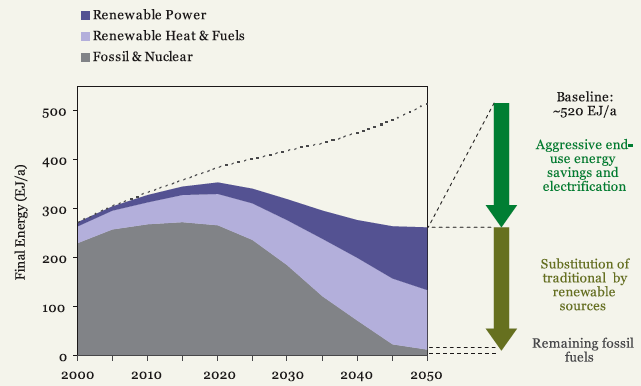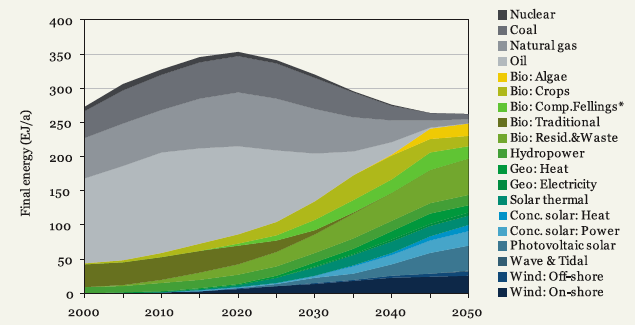A Plan for 100% Renewable Energy by 2050
Posted on 25 March 2011 by dana1981
We recently examined how Australia can meet 100% of its electricity needs from renewable sources by 2020. Here we will examine how that goal can be scaled up for the rest of the world.
Energy consulting firm Ecofys produced a report detailing how we can meet nearly 100% of global energy needs with renewable sources by 2050. Approximately half of the goal is met through increased energy efficiency to first reduce energy demands, and the other half is achieved by switching to renewable energy sources for electricity production (Figure 1).

Figure 1: Ecofys projected global energy consumption between 2000 and 2050
To achieve the goal of 100% renewable energy production, Ecofys forsees that global energy demand in 2050 will be 15% lower than in 2005, despite a growing population and continued economic development in countries like India and China. In their scenario:
"Industry uses more recycled and energy-efficient materials, buildings are constructed or upgraded to need minimal energy for heating and cooling, and there is a shift to more efficient forms of transport.
As far as possible, we use electrical energy rather than solid and liquid fuels. Wind, solar, biomass and hydropower are the main sources of electricity, with solar and geothermal sources, as well as heat pumps providing a large share of heat for buildings and industry. Because supplies of wind and solar power vary, “smart” electricity grids have been developed to store and deliver energy more efficiently. Bioenergy (liquid biofuels and solid biomass) is used as a last resort where other renewable energy sources are not viable."
To achieve the necessary renewable energy production, Ecofys envisions that solar energy supplies about half of our electricity, half of our building heating, and 15% of our industrial heat and fuel by 2050. This requires an average annual solar energy growth rate much lower than we're currently achieving – an encouraging finding.
The report notes that wind could meet one-quarter of the world’s electricity needs by 2050 if current growth rates continue, and sets that as its goal. Ecofys also envisions more than one-third of building heat coming from geothermal sources by 2050. If we double current geothermal electricity production growth rates, it can provide 4% of our total electricity needs by that date. Ocean power, through both waves and tides, accounts for about 1% of global electricity needs in 2050. Hydropower, which currently supplies 15% of global electricity, ultimately supplies 12% in the Ecofys scenario. As you can see in Figure 2, global renewable energy use ramps up gradually between now and 2050.

Figure 2: Energy use by source between 2000 and 2050
Burning biomass (such as plant and animal waste) will supply 60% of industrial fuels and heat, 13% of building heat, and 13% of electricity needs. Much of the proposed biomass use comes from plant residues from agriculture and food processing, sawdust and residues from forestry and wood processing, manure, and municipal waste. All of these renewable energy technologies currently exist, and it's just a matter of implementing them on a sufficiently large scale.
Ecofys also envisions using currently existing technology and expertise to "create buildings that require almost no conventional energy for heating or cooling, through airtight construction, heat pumps and sunlight. The Ecofys scenario foresees all new buildings achieving these standards by 2030." 2–3% of existing buildings will also need to be retrofitted per year to improve energy efficiency. Ecofys notes that Germany is already retrofitting buildings at this rate. Transportation must become more efficient, using more fuel efficient vehicles like electric cars, and increasing use of mass public transportation.
Accomplishing all of this will require a major effort, but Ecofys has a number of suggestions how we can start:
-
Introduce minimum efficiency standards worldwide for all products that consume energy, including buildings
-
Build energy conservation into every stage of product design
-
Introduce strict energy efficiency criteria for all new buildings
-
Introduce an energy tax, or perhaps a carbon emissions price
-
Help developing countries pursue alternatives to inefficient biomass burning, such as such as improved biomass cooking stoves, solar cookers and small-scale biogas digesters
-
Substantial investment in public transportation
-
Make individuals, businesses, and communities more aware of their energy consumption, and encourage increased efficiency
Undoubtedly you're wondering how much this will all cost. Ecofys finds that we will need to divert up to 3% of global gross domestic product (GDP) to investments in materials and energy efficiency, renewable energy, and necessary infrastructure. However, we also save money in terms of reduced fossil fuel use.
The report finds that we can save nearly 4 trillion Euros ($5.7 trillion) per year by 2050 based on energy efficiency savings and reduced fuel costs, as compared to business-as-usual. The up-front investments are expensive, but savings will begin to exceed those costs by 2040, and even sooner if oil prices rise faster than expected, or if we factor in the costs of climate change and the impact of burning fossil fuels on public health. The plan will reduce energy-related greenhouse-gas emissions 80% below 1990 levels by 2050, which will give us a fighting chance to avoid the 2°C global warming "danger limit".
There's a saying, "where there's a will, there's a way". In this case we have a way to fully transition from fossil fuels to renewable energy by 2050. The question is, do we have the will?































 Arguments
Arguments























 0
0  0
0 what don't you understand ?
Mucounter : une nouvelle fois, sorry that you misunderstood me. I did say "for a given quality", they become cheaper and cheaper : of course this is not contradictory with what you said , that "this cost has increased 6-fold in the last ten years" - because the cause of this increase is just the exhaustion of cheap resources, so it is no more "for a given quality". That's exactly my point 1 : as the amount of FF is finite, at some point, the increase of intrinsic costs won't be balanced by an improvement of our techniques, and we'll face the problem of diminishing yields. Since FF are finite, this must occur at some time -which will be precisely the time when FF consumption will naturally decrease because they become more and more expensive.
But that's precisely what I'm claiming : that we are close to this moment (and particularly for oil), so the FF consumption will decrease anyway because they're too expensive (reason 1) So
a) most SRES scenarios are just imagination because they simply don't take into account the exhaustion of cheap resources (assuming that expensive resources can be extracted at the same or even higher rate , which is an aberration).
b) on the other hand, it is extremely unlikely that we burn LESS than what we are able to extract.
In other words, I'm saying that the amount of FF we will extract will depend only on our technological capabilities (which seem to saturate just now , at least for oil), and not at all on fancy colored graphics and fancy scenarios that so many "experts" are drawing.
what don't you understand ?
Mucounter : une nouvelle fois, sorry that you misunderstood me. I did say "for a given quality", they become cheaper and cheaper : of course this is not contradictory with what you said , that "this cost has increased 6-fold in the last ten years" - because the cause of this increase is just the exhaustion of cheap resources, so it is no more "for a given quality". That's exactly my point 1 : as the amount of FF is finite, at some point, the increase of intrinsic costs won't be balanced by an improvement of our techniques, and we'll face the problem of diminishing yields. Since FF are finite, this must occur at some time -which will be precisely the time when FF consumption will naturally decrease because they become more and more expensive.
But that's precisely what I'm claiming : that we are close to this moment (and particularly for oil), so the FF consumption will decrease anyway because they're too expensive (reason 1) So
a) most SRES scenarios are just imagination because they simply don't take into account the exhaustion of cheap resources (assuming that expensive resources can be extracted at the same or even higher rate , which is an aberration).
b) on the other hand, it is extremely unlikely that we burn LESS than what we are able to extract.
In other words, I'm saying that the amount of FF we will extract will depend only on our technological capabilities (which seem to saturate just now , at least for oil), and not at all on fancy colored graphics and fancy scenarios that so many "experts" are drawing.
 of course the amount of still available resources will decrease at some point , but not the URR (including past production).
of course the amount of still available resources will decrease at some point , but not the URR (including past production).
 So your 'fact' inadvertently tells the truth about oil sands: They are a tiny segment of overall production. Unfortunately, the steam assisted recovery technology now in use produces more GHGs than traditional recovery methods.
So your use of facts remains inconsistent. At least your style is consistent: An outrageous declaration provokes a response; your reply is invariably 'you misunderstand' or 'I didn't say that.' As the Cajuns say, C'est tout la même chose, n'est pas?
So your 'fact' inadvertently tells the truth about oil sands: They are a tiny segment of overall production. Unfortunately, the steam assisted recovery technology now in use produces more GHGs than traditional recovery methods.
So your use of facts remains inconsistent. At least your style is consistent: An outrageous declaration provokes a response; your reply is invariably 'you misunderstand' or 'I didn't say that.' As the Cajuns say, C'est tout la même chose, n'est pas?







Comments